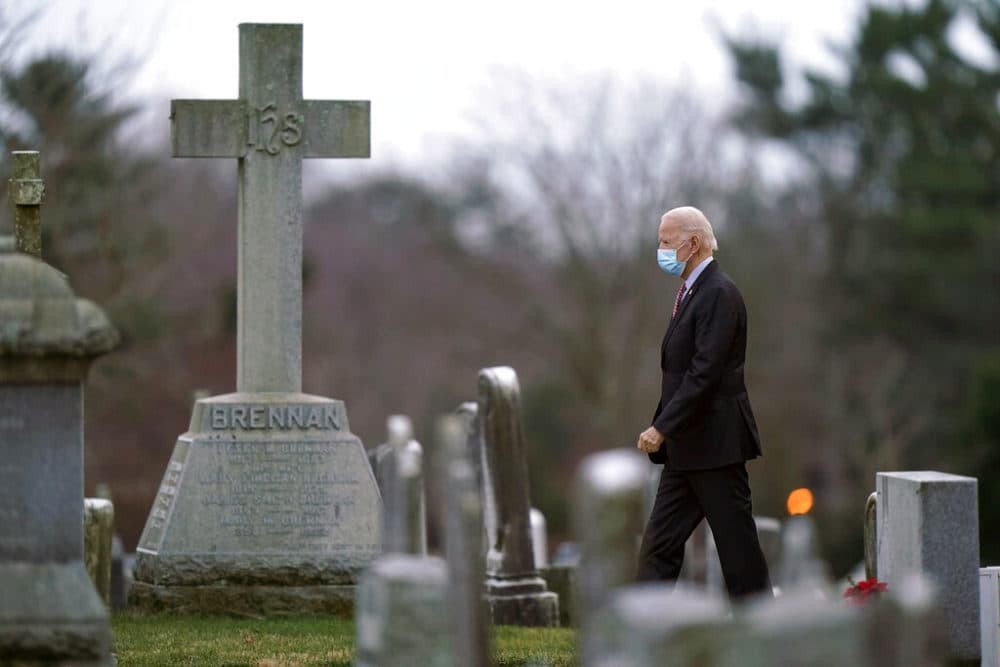Advertisement
How Joe Biden's Catholic Faith Informs His Politics
Resume
President Joe Biden carries a rosary in his pocket and attends Mass regularly. How does his faith inform his politics? And where does Biden's Catholicism land in the spectrum of American Catholic belief?
Guests
Massimo Faggioli, historian and theologian at Villanova University. Author of "Joe Biden and Catholicism in the United States." (@MassimoFaggioli)
Jack Beatty, On Point news analyst. (@JackBeattyNPR)
Also Featured
Ashley McGuire, senior fellow at the Catholic Association.
Anthea Butler, associate professor of religious studies and Africana studies at the University of Pennsylvania. She served as part of a Catholic advisory committee for Joe Biden and she also served as a co-chair of the campaign’s “Catholics for Biden.”
Interview Highlights
How much does President Biden's Catholicism inform his political practice?
Massimo Faggioli: “Joe Biden's Catholicism can engage the new face of this nation, which is more diverse and more secular and more multireligious, because his understanding and his practice of Catholicism is of a big tent. It's not confessional. … And so this is really one of the geniuses of Catholicism, which is not about fitting in one precise particular version of the faith from a cultural point of view, a social point of view. But it's about what can be found as Catholic in new situations, socially, culturally, politically, historically.
"And so, as we know, Joe Biden’s positions on many issues have evolved and adapted. But that is being done, I think, with a Catholic spirit of trying to work to understand what is in common between one particular religious faith and the history of a country, the history of one people.”
How has Biden navigated abortion issues in his political career?
Massimo Faggioli: “It's the most complicated issue for him and for any Catholic in public life anywhere, especially in the United States, there's no question about that. So here Biden has adopted a position that's typical of, I would say, 20th century Catholicism or the distinction between what is your personal faith, and you as a Catholic politician have had to accept. And what you as a Catholic politician, at the service of the whole nation, you can impose or legislate. And so this is very typical of, I would say, an old style Catholicism, which is typical of the Catholic Church of the Second Vatican Council, Vatican II after the ‘60s.
“And it is something that in these last few years have become very unpopular with the new generation of conservative Catholics that have made a movement of the rejection, not just of the pro-choice platform only, but of the whole concept of a distinction between your personal life as a Catholic and what you as a Catholic politician in public life can do. And so here Joe Biden, in some sense, is a survivor of the 20th century Catholicism, that we're trying to articulate something that's very important for a church in a multicultural, multireligious country like the United States.”
How much has American Catholicism changed since John F. Kennedy's presidential campaign and presidency?
Massimo Faggioli: “It has changed enormously. Because back then, in 1960, Kennedy's Catholicism was a problem for many Protestants and many secular people in this country, but not for his fellow Catholics. Even those who were not very happy with the idea of having him in the White House. Joe Biden's Catholicism is not a problem for most Protestants or more secular people in this country. It's a problem for a number of fellow Catholics in this country.
“Exactly for the issues that you have mentioned, because in 1960, John Kennedy never had to answer questions on abortion, on same sex marriage, on LGBTQ issues. And so this is really an incredibly changed landscape also from the institutional point of view, because we know that a few bishops in 1960 were not happy with John Kennedy as a candidate. But when he was elected, they rallied behind him in this moment of pride, which is something that you really cannot say for what happened to Joe Biden in these last few months.”
What drove that change in American Catholicism from the 1960s to today, that put social issues at the center of how they view politics?
Massimo Faggioli: “Many things happen, but I think especially: One, in 1960, the Catholic Church and Catholics were still perceived a little bit as an outsider and as a minority, still, especially in politics. In the last 60 years, they have become the single largest church in this country, you now have many Catholics in politics, the speaker of the House, five justices on the Supreme Court. But at the same time, Catholicism has become much more polarized, to be very blunt.
“Catholic progressivism … is much more progressive than in any other country. And Catholic conservatism in this country is much more conservative than in any other country. And so you have really a split church where the middle ground is difficult to find. And it's much easier to talk to the more progressive, most progressive or more conservative wings. And this is why any Catholic in public life has to find this desperately difficult to find middle ground, while keeping in balance different identities.”
On the six Catholic Supreme Court justices
Massimo Faggioli: “It's a large majority of Catholics, but what's most striking is that there's no Protestant on the Supreme Court right now. So which is a stunning reversal, if one considers the origins of this country. … That's why we should keep in mind that it's true that in this country, constitutionally, there is a separation between church and state. But what has never been part of this country is a separation between religion and politics. It's a distinction that we should make.
“And so here it's absolutely right that Catholic conservatives in this country in these last couple of decades especially, have been very effective in creating a conservative movement, especially in law schools, the conservative legal movement. And so this is going to be part of the future of this country, and of this church. And so this is why the election of a Catholic like Biden is very important, it may be a signal of something, but Catholic liberals shouldn't fool themselves in thinking that the opposition or that kind of Catholic culture is going to go away. That's absolutely important to keep in mind.”
On a shift in U.S. Catholicism
Massimo Faggioli: “If there's a shift, it really still has to come. I think the Catholic Church in the U.S. at the institutional level still has to understand what happened in these last four years under Donald Trump, which is seen by many Catholics and not only in this country, but globally as a moral failure to see what was happening. And so there's a long road ahead. And surely, I mean, having a Catholic in the White House could be seen as an alternative kind of leadership for Catholics in this country, compared to bishops. And so this is something that will have to be studied, because we have never seen anything like this before.”
Book Excerpt
Excerpt from "Joe Biden and Catholicism in the United States" by Massimo Faggioli
Excerpt from "Joe Biden and Catholicism in the United States" by Massimo Faggioli. Copyright © 2021 by Massimo Faggioli. Reprinted by permission of Bayard, Inc.
From The Reading List
The Guardian: "Soul of the nation: how Joe Biden's faith will shape his presidency" — "He carries a rosary in his pocket, one that belonged to his dead son, Beau. On election day last Tuesday, he went to mass, as he does every Sunday."
Boston Globe: "Joe Biden’s Catholic faith has shaped his life and approach to politics. How will it shape his presidency?" — "On the morning of one of the most consequential days in his life, and maybe the nation’s history, too, Joe Biden attended Mass at the unassuming Roman Catholic church near his Delaware home."
Washington Post: "Biden could redefine what it means to be a Catholic in good standing. Catholics are divided on whether that is a good thing." — "Bishops have already created a working group to deal with the 'difficult' situation of his presidency. Priests from Maryland to Fort Worth have preached that the president-elect isn’t even really a Catholic."
NPR: "How Joe Biden's Faith Shapes His Politics" — "When Joe Biden seeks to inspire or comfort, he turns to his faith. He speeches are woven with references to God, biblical language or the pope."
The Christian Post: "The greatest commandment has guided my politics" — "In the Gospel of Matthew, Jesus is asked, 'Teacher, which is the greatest commandment in the law?'"
Religious News Service: "Joe Biden on restoring the soul of our nation" — "Today’s politics are too toxic, mean and divisive. People are too quick to demonize and dehumanize, too ready to dismiss all that we have in common as Americans."
National Catholic Reporter: "How Joe Biden's Catholic roots have shaped his public life" — "As uprisings sparked by George Floyd's death erupted throughout the nation, Joe Biden turned to his Catholic faith to offer inspiration to a nation gripped by yet another killing of an unarmed Black man at the hands of a white police officer."
This program aired on January 20, 2021.

